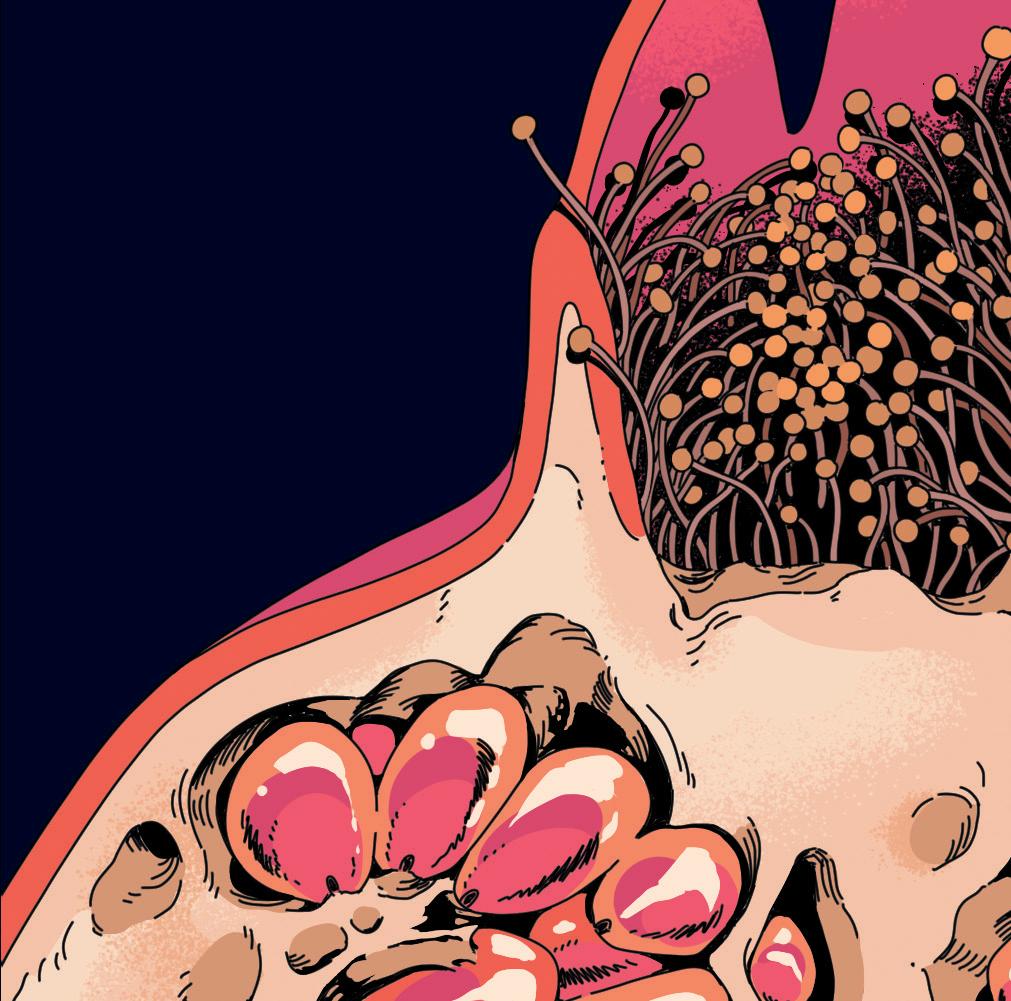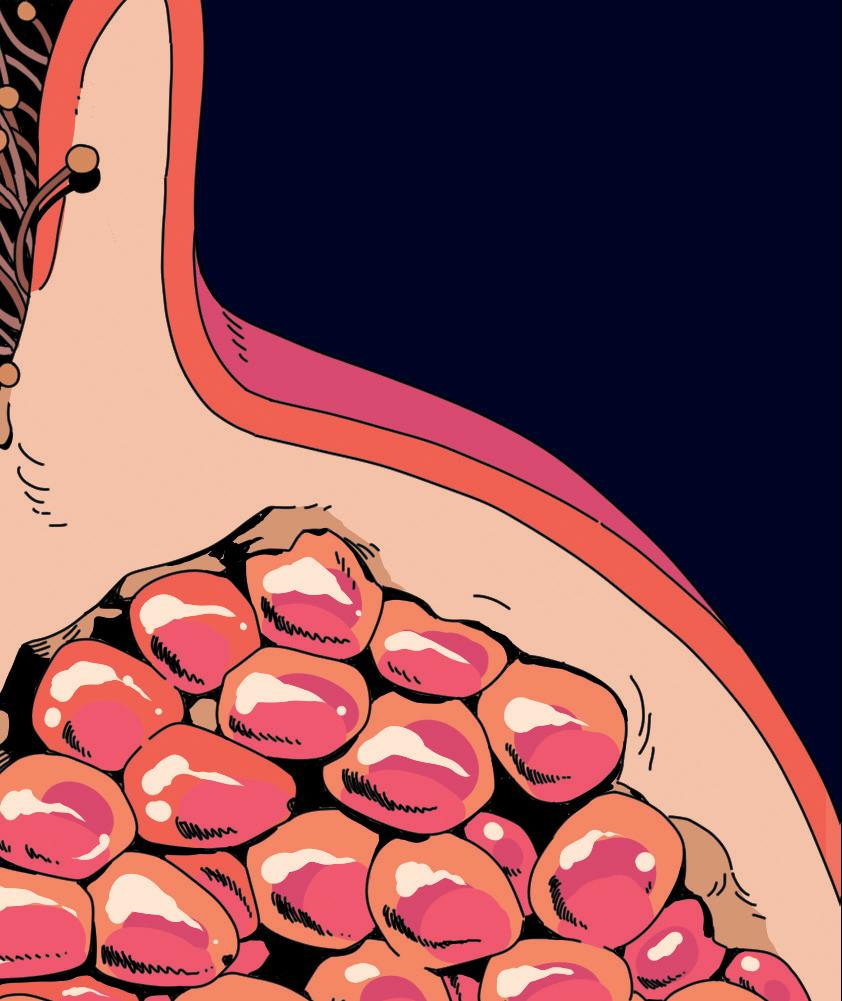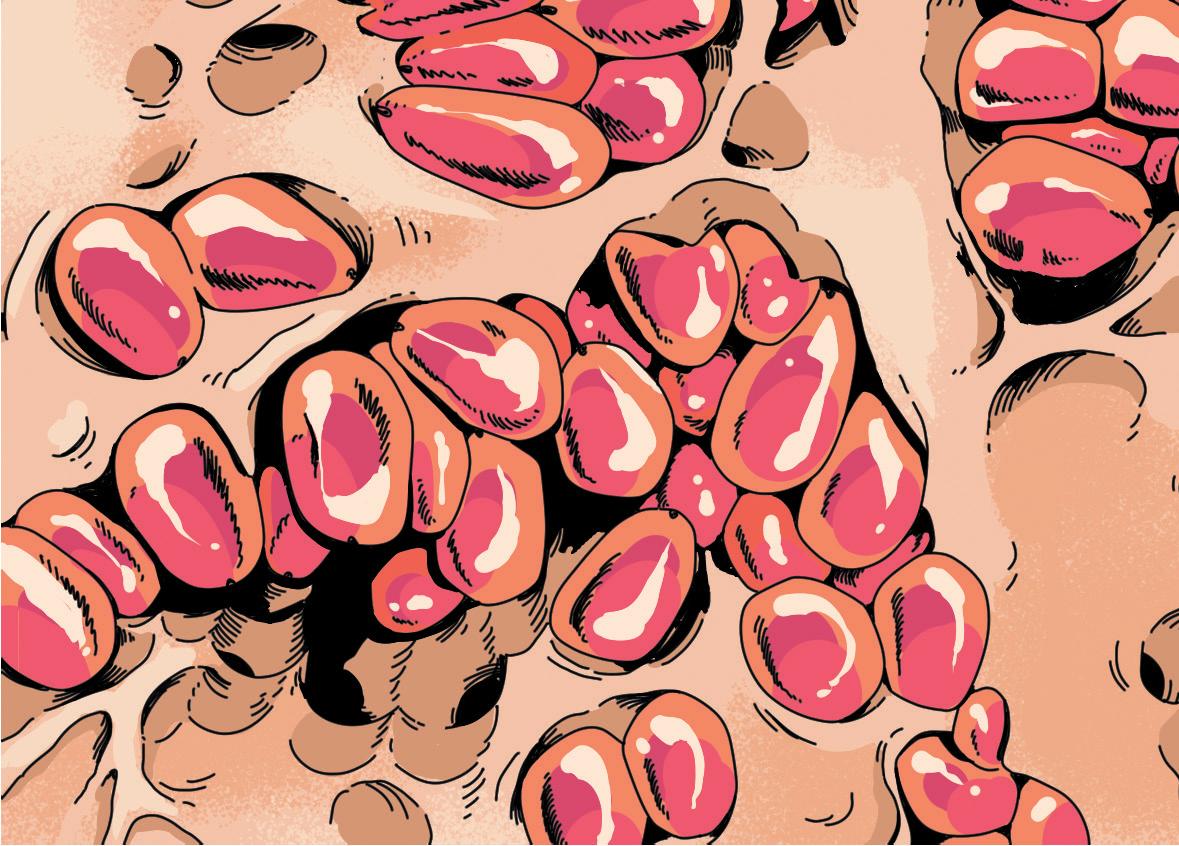














A celebration of the very best literary horror, a series of terrifying novels and tales that for generations have thrilled, captivated and kept readers wide awake at night.
Edith Wharton
PENGUIN BOOK S
UK | USA | Canada | Ireland | Australia India | New Zealand | South Africa
Penguin Books is part of the Penguin Random House group of companies whose addresses can be found at global.penguinrandomhouse.com.
Penguin Random House UK , One Embassy Gardens, 8 Viaduct Gardens, London SW 11 7BW penguin.co.uk
These stories first collected in Ghosts by D. Appleton & Company (1937) This edition published in Penguin Books in 2025 001
Penguin Random House values and supports copyright. Copyright fuels creativity, encourages diverse voices, promotes freedom of expression and supports a vibrant culture. Thank you for purchasing an authorized edition of this book and for respecting intellectual property laws by not reproducing, scanning or distributing any part of it by any means without permission. You are supporting authors and enabling Penguin Random House to continue to publish books for everyone. No part of this book may be used or reproduced in any manner for the purpose of training artificial intelligence technologies or systems. In accordance with Article 4(3) of the DSM Directive 2019/790, Penguin Random House expressly reserves this work from the text and data mining exception
Set in 11/13pt Dante MT Std Typeset by Six Red Marbles UK, Thetford, Norfolk Printed and bound in Great Britain by Clays Ltd, Elcograf S.p.A.
The authorized representative in the EEA is Penguin Random House Ireland, Morrison Chambers, 32 Nassau Street, Dublin D 02 YH 68
A CIP catalogue record for this book is available from the British Library
ISBN : 978–1–405–98614–4
Penguin Random House is committed to a sustainable future for our business, our readers and our planet. This book is made from Forest Stewardship Council® certified paper.
ICharlotte Ashby paused on her doorstep. Dark had descended on the brilliancy of the March afternoon, and the grinding, rasping street life of the city was at its highest. She turned her back on it, standing for a moment in the old-fashioned, marble-flagged vestibule before she inserted her key in the lock. The sash curtains drawn across the panes of the inner door softened the light within to a warm blur through which no details showed. It was the hour when, in the first months of her marriage to Kenneth Ashby, she had most liked to return to that quiet house in a street long since deserted by business and fashion. The contrast between the soulless roar of New York, its devouring blaze of lights, the oppression of its congested traffic, congested houses, lives, minds and this veiled sanctuary she called home, always stirred her profoundly. In the very heart of the hurricane she had found her tiny islet – or thought she had. And now, in the last months, everything was changed, and she always wavered on the doorstep and had to force herself to enter.
While she stood there she called up the scene within: the hall hung
* Persephone, daughter of Demeter, goddess of fertility, was abducted and taken to Hades by Pluto, the god of the underworld. Her mother begged Jupiter to intercede, and he did so. But Persephone had broken her vow of abstinence in Hades by eating some pomegranate seeds. She was therefore required to spend a certain number of months each year – essentially the winter months – with Pluto.
with old prints, the ladder-like stairs, and on the left her husband’s long shabby library, full of books and pipes and worn armchairs inviting to meditation. How she had loved that room! Then, upstairs, her own drawing room, in which, since the death of Kenneth’s first wife, neither furniture nor hangings had been changed, because there had never been money enough, but which Charlotte had made her own by moving furniture about and adding more books, another lamp, a table for the new reviews. Even on the occasion of her only visit to the first Mrs Ashby – a distant, self-centred woman, whom she had known very slightly – she had looked about her with an innocent envy, feeling it to be exactly the drawing room she would have liked for herself; and now for more than a year it had been hers to deal with as she chose – the room to which she hastened back at dusk on winter days, where she sat reading by the fire, or answering notes at the pleasant roomy desk, or going over her stepchildren’s copybooks, till she heard her husband’s step.
Sometimes friends dropped in; sometimes – oftener – she was alone; and she liked that best, since it was another way of being with Kenneth, thinking over what he had said when they parted in the morning, imagining what he would say when he sprang up the stairs, found her by herself and caught her to him.
Now, instead of this, she thought of one thing only – the letter she might or might not find on the hall table. Until she had made sure whether or not it was there, her mind had no room for anything else. The letter was always the same – a square grayish envelope with ‘Kenneth Ashby, Esquire,’ written on it in bold but faint characters. From the first it had struck Charlotte as peculiar that anyone who wrote such a firm hand should trace the letters so lightly; the address was always written as though there were not enough ink in the pen, or the writer’s wrist were too weak to bear upon it. Another curious thing was that, in spite of its masculine curves, the writing was so visibly feminine. Some hands are sexless, some masculine, at first
glance; the writing on the gray envelope, for all its strength and assurance, was without doubt a woman’s. The envelope never bore anything but the recipient’s name; no stamp, no address. The letter was presumably delivered by hand – but by whose? No doubt it was slipped into the letter box, whence the parlourmaid, when she closed the shutters and lit the lights, probably extracted it. At any rate, it was always in the evening, after dark, that Charlotte saw it lying there. She thought of the letter in the singular, as ‘it,’ because, though there had been several since her marriage – seven, to be exact – they were so alike in appearance that they had become merged in one another in her mind, become one letter, become ‘it.’
The first had come the day after their return from their honeymoon – a journey prolonged to the West Indies, from which they had returned to New York after an absence of more than two months. Re-entering the house with her husband, late on that first evening – they had dined at his mother’s – she had seen, alone on the hall table, the gray envelope. Her eye fell on it before Kenneth’s, and her first thought was: ‘Why, I’ve seen that writing before’; but where she could not recall. The memory was just definite enough for her to identify the script whenever it looked up at her faintly from the same pale envelope; but on that first day she would have thought no more of the letter if, when her husband’s glance lit on it, she had not chanced to be looking at him. It all happened in a flash – his seeing the letter, putting out his hand for it, raising it to his shortsighted eyes to decipher the faint writing, and then abruptly withdrawing the arm he had slipped through Charlotte’s, and moving away to the hanging light, his back turned to her. She had waited – waited for a sound, an exclamation; waited for him to open the letter; but he had slipped it into his pocket without a word and followed her into the library. And there they had sat down by the fire and lit their cigarettes, and he had remained silent, his head thrown back broodingly against the armchair, his eyes fixed on the hearth, and presently had passed his hand over his forehead and
said: ‘Wasn’t it unusually hot at my mother’s tonight? I’ve got a splitting head. Mind if I take myself off to bed?’
That was the first time. Since then Charlotte had never been present when he had received the letter. It usually came before he got home from his office, and she had to go upstairs and leave it lying there. But even if she had not seen it, she would have known it had come by the change in his face when he joined her – which, on those evenings, he seldom did before they met for dinner. Evidently, whatever the letter contained, he wanted to be by himself to deal with it; and when he reappeared he looked years older, looked emptied of life and courage, and hardly conscious of her presence. Sometimes he was silent for the rest of the evening; and if he spoke, it was usually to hint some criticism of her household arrangements, suggest some change in the domestic administration, to ask, a little nervously, if she didn’t think Joyce’s nursery governess was rather young and flighty, or if she herself always saw to it that Peter – whose throat was delicate – was properly wrapped up when he went to school. At such times Charlotte would remember the friendly warnings she had received when she became engaged to Kenneth Ashby: ‘Marrying a heartbroken widower! Isn’t that rather risky? You know Elsie Ashby absolutely dominated him’; and how she had jokingly replied: ‘He may be glad of a little liberty for a change.’ And in this respect she had been right. She had needed no one to tell her, during the first months, that her husband was perfectly happy with her. When they came back from their protracted honeymoon the same friends said: ‘What have you done to Kenneth? He looks twenty years younger’; and this time she answered with careless joy: ‘I suppose I’ve got him out of his groove.’
But what she noticed after the gray letters began to come was not so much his nervous tentative faultfinding – which always seemed to be uttered against his will – as the look in his eyes when he joined her after receiving one of the letters. The look was not unloving, not even indifferent; it was the look of a man
who had been so far away from ordinary events that when he returns to familiar things they seem strange. She minded that more than the faultfinding.
Though she had been sure from the first that the handwriting on the gray envelope was a woman’s, it was long before she associated the mysterious letters with any sentimental secret. She was too sure of her husband’s love, too confident of filling his life, for such an idea to occur to her. It seemed far more likely that the letters – which certainly did not appear to cause him any sentimental pleasure – were addressed to the busy lawyer than to the private person. Probably they were from some tiresome client – women, he had often told her, were nearly always tiresome as clients – who did not want her letters opened by his secretary and therefore had them carried to his house. Yes; but in that case the unknown female must be unusually troublesome, judging from the effect her letters produced. Then again, though his professional discretion was exemplary, it was odd that he had never uttered an impatient comment, never remarked to Charlotte, in a moment of expansion, that there was a nuisance of a woman who kept badgering him about a case that had gone against her. He had made more than one semiconfidence of the kind – of course without giving names or details; but concerning this mysterious correspondent his lips were sealed.
There was another possibility: what is euphemistically called an ‘old entanglement.’ Charlotte Ashby was a sophisticated woman. She had few illusions about the intricacies of the human heart; she knew that there were often old entanglements. But when she had married Kenneth Ashby, her friends, instead of hinting at such a possibility, had said: ‘You’ve got your work cut out for you. Marrying a Don Juan is a sinecure to it. Kenneth’s never looked at another woman since he first saw Elsie Corder. During all the years of their marriage he was more like an unhappy lover than a comfortably contented husband. He’ll never let you move an armchair or change the place of a lamp;
and whatever you venture to do, he’ll mentally compare with what Elsie would have done in your place.’
Except for an occasional nervous mistrust as to her ability to manage the children – a mistrust gradually dispelled by her good humour and the children’s obvious fondness for her – none of these forebodings had come true. The desolate widower, of whom his nearest friends said that only his absorbing professional interests had kept him from suicide after his first wife’s death, had fallen in love, two years later, with Charlotte Gorse, and after an impetuous wooing had married her and carried her off on a tropical honeymoon. And ever since he had been as tender and lover-like as during those first radiant weeks. Before asking her to marry him he had spoken to her frankly of his great love for his first wife and his despair after her sudden death; but even then he had assumed no stricken attitude, or implied that life offered no possibility of renewal. He had been perfectly simple and natural, and had confessed to Charlotte that from the beginning he had hoped the future held new gifts for him. And when, after their marriage, they returned to the house where his twelve years with his first wife had been spent, he had told Charlotte at once that he was sorry he couldn’t afford to do the place over for her, but that he knew every woman had her own views about furniture and all sorts of household arrangements a man would never notice, and had begged her to make any changes she saw fit without bothering to consult him. As a result, she made as few as possible; but his way of beginning their new life in the old setting was so frank and unembarrassed that it put her immediately at her ease, and she was almost sorry to find that the portrait of Elsie Ashby, which used to hang over the desk in his library, had been transferred in their absence to the children’s nursery. Knowing herself to be the indirect cause of this banishment, she spoke of it to her husband; but he answered: ‘Oh, I thought they ought to grow up with her looking down on them.’ The answer moved Charlotte, and satisfied her; and
as time went by she had to confess that she felt more at home in her house, more at ease and in confidence with her husband, since that long coldly beautiful face on the library wall no longer followed her with guarded eyes. It was as if Kenneth’s love had penetrated to the secret she hardly acknowledged to her own heart – her passionate need to feel herself the sovereign even of his past.
With all this stored-up happiness to sustain her, it was curious that she had lately found herself yielding to a nervous apprehension. But there the apprehension was; and on this particular afternoon – perhaps because she was more tired than usual, or because of the trouble of finding a new cook or, for some other ridiculously trivial reason, moral or physical – she found herself unable to react against the feeling. Latchkey in hand, she looked back down the silent street to the whirl and illumination of the great thoroughfare beyond, and up at the sky already aflare with the city’s nocturnal life. ‘Outside there,’ she thought, ‘skyscrapers, advertisements, telephones, wireless, airplanes, movies, motors, and all the rest of the twentieth century; and on the other side of the door something I can’t explain, can’t relate to them. Something as old as the world, as mysterious as life . Nonsense! What am I worrying about? There hasn’t been a letter for three months now – not since the day we came back from the country after Christmas . . . Queer that they always seem to come after our holidays! . . . Why should I imagine there’s going to be one tonight!’
No reason why, but that was the worst of it – one of the worst! – that there were days when she would stand there cold and shivering with the premonition of something inexplicable, intolerable, to be faced on the other side of the curtained panes; and when she opened the door and went in, there would be nothing; and on other days when she felt the same premonitory chill, it was justified by the sight of the gray envelope. So that ever since the last had come she had taken to feeling cold and
premonitory every evening, because she never opened the door without thinking the letter might be there.
Well, she’d had enough of it: that was certain. She couldn’t go on like that. If her husband turned white and had a headache on the days when the letter came, he seemed to recover afterward; but she couldn’t. With her the strain had become chronic, and the reason was not far to seek. Her husband knew from whom the letter came and what was in it; he was prepared beforehand for whatever he had to deal with, and master of the situation, however bad; whereas she was shut out in the dark with her conjectures.
‘I can’t stand it! I can’t stand it another day!’ she exclaimed aloud, as she put her key in the lock. She turned the key and went in; and there, on the table, lay the letter.
She was almost glad of the sight. It seemed to justify everything, to put a seal of definiteness on the whole blurred business. A letter for her husband; a letter from a woman – no doubt another vulgar case of ‘old entanglement.’ What a fool she had been ever to doubt it, to rack her brains for less obvious explanations! She took up the envelope with a steady contemptuous hand, looked closely at the faint letters, held it against the light and just discerned the outline of the folded sheet within. She knew that now she would have no peace till she found out what was written on that sheet.
Her husband had not come in; he seldom got back from his office before half-past six or seven, and it was not yet six. She would have time to take the letter up to the drawing room, hold it over the tea kettle which at that hour always simmered by the fire in expectation of her return, solve the mystery and replace the letter where she had found it. No one would be the wiser,
and her gnawing uncertainty would be over. The alternative, of course, was to question her husband; but to do that seemed even more difficult. She weighed the letter between thumb and finger, looked at it again under the light, started up the stairs with the envelope – and came down again and laid it on the table.
‘No, I evidently can’t,’ she said, disappointed.
What should she do, then? She couldn’t go up alone to that warm welcoming room, pour out her tea, look over her correspondence, glance at a book or review – not with that letter lying below and the knowledge that in a little while her husband would come in, open it and turn into the library alone, as he always did on the days when the gray envelope came.
Suddenly she decided. She would wait in the library and see for herself; see what happened between him and the letter when they thought themselves unobserved. She wondered the idea had never occurred to her before. By leaving the door ajar, and sitting in the corner behind it, she could watch him unseen . . . Well, then, she would watch him! She drew a chair into the corner, sat down, her eyes on the crack, and waited.
As far as she could remember, it was the first time she had ever tried to surprise another person’s secret, but she was conscious of no compunction. She simply felt as if she were fighting her way through a stifling fog that she must at all costs get out of.
At length she heard Kenneth’s latchkey and jumped up. The impulse to rush out and meet him had nearly made her forget why she was there; but she remembered in time and sat down again. From her post she covered the whole range of his movements – saw him enter the hall, draw the key from the door and take off his hat and overcoat. Then he turned to throw his gloves on the hall table, and at that moment he saw the envelope. The light was full on his face, and what Charlotte first noted there was a look of surprise. Evidently he had not expected the letter – had not thought of the possibility of its being there that day. But though he had not expected it, now that he saw it he
knew well enough what it contained. He did not open it immediately, but stood motionless, the colour slowly ebbing from his face. Apparently he could not make up his mind to touch it; but at length he put out his hand, opened the envelope, and moved with it to the light. In doing so he turned his back on Charlotte, and she saw only his bent head and slightly stooping shoulders. Apparently all the writing was on one page, for he did not turn the sheet but continued to stare at it for so long that he must have reread it a dozen times – or so it seemed to the woman breathlessly watching him. At length she saw him move; he raised the letter still closer to his eyes, as though he had not fully deciphered it. Then he lowered his head, and she saw his lips touch the sheet.
‘Kenneth!’ she exclaimed, and went on out into the hall.
The letter clutched in his hand, her husband turned and looked at her. ‘Where were you?’ he said, in a low bewildered voice, like a man waked out of his sleep.
‘In the library, waiting for you.’ She tried to steady her voice: ‘What’s the matter! What’s in that letter! You look ghastly.’
Her agitation seemed to calm him, and he instantly put the envelope into his pocket with a slight laugh. ‘Ghastly? I’m sorry. I’ve had a hard day in the office – one or two complicated cases. I look dog-tired, I suppose.’
‘You didn’t look tired when you came in. It was only when you opened that letter –’
He had followed her into the library, and they stood gazing at each other. Charlotte noticed how quickly he had regained his self-control; his profession had trained him to rapid mastery of face and voice. She saw at once that she would be at a disadvantage in any attempt to surprise his secret, but at the same moment she lost all desire to maneuver, to trick him into betraying anything he wanted to conceal. Her wish was still to penetrate the mystery, but only that she might help him to bear the burden it implied. ‘Even if it is another woman,’ she thought.
‘Kenneth,’ she said, her heart beating excitedly, ‘I waited here
on purpose to see you come in. I wanted to watch you while you opened that letter.’
His face, which had paled, turned to dark red; then it paled again. ‘That letter? Why especially that letter?’
‘Because I’ve noticed that whenever one of those letters comes it seems to have such a strange effect on you.’
A line of anger she had never seen before came out between his eyes, and she said to herself: ‘The upper part of his face is too narrow; this is the first time I ever noticed it.’
She heard him continue, in the cool and faintly ironic tone of the prosecuting lawyer making a point: ‘Ah, so you’re in the habit of watching people open their letters when they don’t know you’re there?’
‘Not in the habit. I never did such a thing before. But I had to find out what she writes to you, at regular intervals, in those gray envelopes.’
He weighed this for a moment; then: ‘The intervals have not been regular,’ he said.
‘Oh, I dare say you’ve kept a better account of the dates than I have,’ she retorted, her magnanimity vanishing at his tone. ‘All I know is that every time that woman writes to you –’
‘Why do you assume it’s a woman?’
‘It’s a woman’s writing. Do you deny it?’
He smiled. ‘No, I don’t deny it. I asked only because the writing is generally supposed to look more like a man’s.’
Charlotte passed this over impatiently. ‘And this woman – what does she write to you about?’
Again he seemed to consider a moment. ‘About business.’
‘Legal business?’
‘In a way, yes. Business in general.’
‘You look after her affairs for her?’
‘Yes.’
‘You’ve looked after them for a long time?’
‘Yes. A very long time.’
‘Kenneth, dearest, won’t you tell me who she is?’
‘No. I can’t.’ He paused, and brought out, as if with certain hesitation: ‘Professional secrecy.’
The blood rushed from Charlotte’s heart to her temples. ‘Don’t say that – don’t!’
‘Why not?’
‘Because I saw you kiss the letter.’
The effect of the words was so disconcerting that she instantly repented having spoken them. Her husband, who had submitted to her cross-questioning with a sort of contemptuous composure, as though he were humouring an unreasonable child, turned on her a face of terror and distress. For a minute he seemed unable to speak; then collecting himself, with an effort, he stammered out: ‘The writing is very faint; you must have seen me holding the letter close to my eyes to try to decipher it.’
‘No; I saw you kissing it.’ He was silent. ‘Didn’t I see you kissing it?’
He sank back into indifference. ‘Perhaps.’
‘Kenneth! You stand there and say that – to me?’
‘What possible difference can it make to you? The letter is on business, as I told you. Do you suppose I’d lie about it? The writer is a very old friend whom I haven’t seen for a long time.’
‘Men don’t kiss business letters, even from women who are very old friends, unless they have been their lovers, and still regret them.’
He shrugged his shoulders slightly and turned away, as if he considered the discussion at an end and were faintly disgusted at the turn it had taken.
‘Kenneth!’ Charlotte moved toward him and caught hold of his arm.
He paused with a look of weariness and laid his hand over hers. ‘Won’t you believe me?’ he asked gently.
‘How can I? I’ve watched these letters come to you – for months now they’ve been coming. Ever since we came back
from the West Indies – one of them greeted me the very day we arrived. And after each one of them I see their mysterious effect on you, I see you disturbed, unhappy, as if someone were trying to estrange you from me.’
‘No, dear; not that. Never!’
She drew back and looked at him with passionate entreaty. ‘Well, then, prove it to me, darling. It’s so easy!’
He forced a smile. ‘It’s not easy to prove anything to a woman who’s once taken an idea into her head.’
‘You’ve only got to show me the letter.’
His hand slipped from hers and he drew back and shook his head.
‘You won’t?’
‘I can’t.’
‘Then the woman who wrote it is your mistress.’
‘No, dear. No.’
‘Now now, perhaps. I suppose she’s trying to get you back, and you’re struggling, out of pity for me. My poor Kenneth!’
‘I swear to you she never was my mistress.’
Charlotte felt the tears rushing to her eyes. ‘Ah, that’s worse, then – that’s hopeless! The prudent ones are the kind that keep their hold on a man. We all know that.’ She lifted her hands and hid her face in them.
Her husband remained silent; he offered neither consolation nor denial, and at length, wiping away her tears, she raised her eyes almost timidly to his.
‘Kenneth, think! We’ve been married such a short time. Imagine what you’re making me suffer. You say you can’t show me this letter. You refuse even to explain it.’
‘I’ve told you the letter is on business. I will swear to that too.’
‘A man will swear to anything to screen a woman. If you want me to believe you, at least tell me her name. If you’ll do that, I promise you I won’t ask to see the letter.’
There was a long interval of suspense, during which she felt
her heart beating against her ribs in quick admonitory knocks, as if warning her of the danger she was incurring.
‘I can’t,’ he said at length.
‘Not even her name?’
‘No.’
‘You can’t tell me anything more?’
‘No.’
Again a pause; this time they seemed both to have reached the end of their arguments and to be helplessly facing each other across a baffling waste of incomprehension.
Charlotte stood breathing rapidly, her hands against her breast. She felt as if she had run a hard race and missed the goal. She had meant to move her husband and had succeeded only in irritating him; and this error of reckoning seemed to change him into a stranger, a mysterious incomprehensible being whom no argument or entreaty of hers could reach. The curious thing was that she was aware in him of no hostility or even impatience, but only of a remoteness, an inaccessibility, far more difficult to overcome. She felt herself excluded, ignored, blotted out of his life. But after a moment or two, looking at him more calmly, she saw that he was suffering as much as she was. His distant guarded face was drawn with pain; the coming of the gray envelope, though it always cast a shadow, had never marked him as deeply as this discussion with his wife.
Charlotte took heart; perhaps, after all, she had not spent her last shaft. She drew nearer and once more laid her hand on his arm. ‘Poor Kenneth! If you knew how sorry I am for you –’
She thought he winced slightly at this expression of sympathy, but he took her hand and pressed it.
‘I can think of nothing worse than to be incapable of loving long,’ she continued, ‘to feel the beauty of a great love and to be too unstable to bear its burden.’
He turned on her a look of wistful reproach. ‘Oh, don’t say that of me. Unstable!’